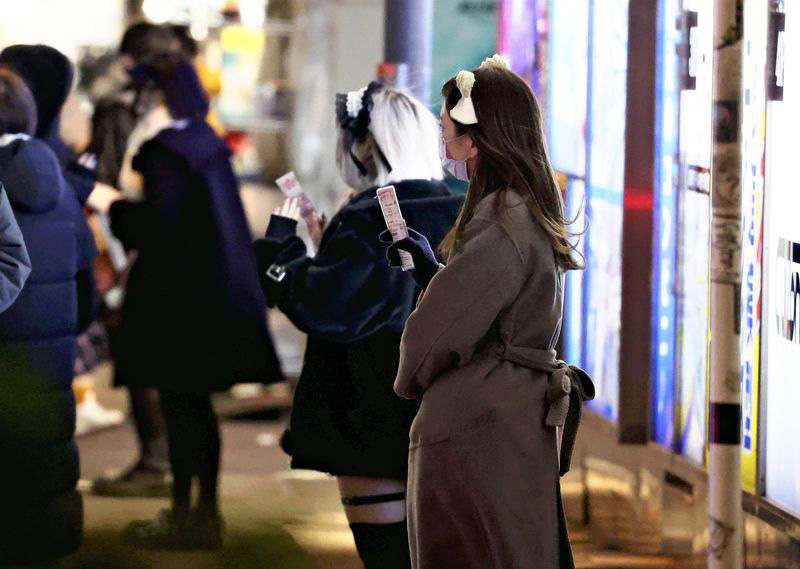
Concept cafe employees hand out flyers on a street in Akihabara district, Tokyo, on Jan. 7.
13:55 JST, January 18, 2022
Operators of themed cafes in Tokyo’s Akihabara district established the Akihabara Concept Shop Union this month, aiming to set up a certification system for quality businesses, and put an end to rip-offs and unscrupulous touting of customers.
About 70 themed cafes, often called “concept cafes,” have already applied to the union for certification.
Alternate world
“Why don’t you stop by our maid cafe?” a woman in a maid uniform said to passersby at about 6 p.m. on Jan. 7 in a side street near JR Akihabara Station in Chiyoda Ward. She and other women smiled as they waved at people, holding signs saying things like, “All you can drink for ¥2,000 for two hours.”
Lined up a few meters apart, they approached men walking by. They pulled on the men’s hands and disappeared one by one into nearby buildings.
Maid cafes first appeared in Akihabara around the year 2000, when the area was filled with stores specializing in anime and figurines. Recently, maid cafes have come to be known as a type of “concept cafe,” where the staff wear costumes based on a certain theme, such as warlords, ninjas and anime characters.
Although fewer customers are visiting such cafes recently due to the spread of the novel coronavirus, some new cafes are taking over locations vacated by other establishments.
“I can enjoy an alternate world where waitresses in maid uniforms cast magic spells on my food, which is so fascinating,” said a company employee from Numazu, Shizuoka Prefecture, who has been coming to cafes since his student days.
Illegal shops increasing
According to Chiyoda Ward, there are about 200 concept cafes, including maid cafes, in Akihabara alone. Many have registered with the ward as eating establishments. Crowds of tourists from overseas visited Akihabara before the pandemic, and these cafes have helped attract customers to the area.
Several years ago, however, girls bars from other downtown areas such as Tokyo’s Shinjuku and Ikebukuro districts began to flood into Akihabara. There has been an increasing number of businesses posing as maid cafes and illegal establishments that employ people under 18. Incessant touting and exorbitant charges are becoming more and more notable.
According to investigators, seven maid cafes were found last spring to be allegedly violating the Control and Improvement of Amusement Business Law. One was selling a bottle of juice for ¥20,000, despite the regular price being a few hundred yen.
Concerned that Akihabara’s reputation could deteriorate and tourism suffer, the AKIBA safety and security project was launched in June 2021 by local volunteers, Chiyoda Ward, and the Tokyo Metropolitan Police Department’s Manseibashi Station, which has jurisdiction over Akihabara.
In addition to stepping up patrols of the streets, the project has reached agreements with about 50 stores to have only one staffer hand out leaflets outside the business. As a result, the number of calls to police about touting in the area dropped from about 1,100 in 2020 to about 350 last year, according to the police station, a decline of two-thirds.
Backing good businesses
The Akihabara Concept Shop Union was established by concept cafe operators on Jan. 1, with the help of the ward office and police.
The union has so far received applications for membership from about 70 businesses. It is working to screen them for certification, through such measures as having businesses submit lists of their employees and confirming the staffers’ ages. Certified stores will be required to comply with 11 rules, such as not touting in a way that makes people uncomfortable, according to the organization.
A man who has run a maid cafe in Akihabara for about 15 years said he has already applied for membership. “Even though we run our business properly, we’ve been mistakenly perceived as an ‘illicit maid cafe in Akihabara,’” he said. “I hope [the establishment of the union] will help eliminate places that don’t follow the rules.”
The union plans to allow approved stores to display a logo of certification. It also plans to create a map of certified establishments.
“Concept cafes are a valuable tourist resource. We want to support the best stores and enhance the appeal of the city,” said union president Tomio Izumi.
Cultural destination
Akihabara developed as an electronics area after World War II, when radio parts dealers flocked to the area to sell their products on the black market.
During the period of high economic growth, electronics stores were crowded with customers looking for the so-called “three sacred treasures” of the post-war period: televisions, washing machines and refrigerators.
Since the 1990s, the number of stores specializing in personal computers, game software and anime-related goods has increased, attracting many young people. In recent years, dedicated theaters for idol groups have opened for their concerts. The area has become a center of Japanese pop culture.
Top Articles in Business
-

Prudential Life Insurance Plans to Fully Compensate for Damages Caused by Fraudulent Actions Without Waiting for Third-Party Committee Review
-

Narita Airport, Startup in Japan Demonstrate Machine to Compress Clothes for Tourists to Prevent People from Abandoning Suitcases
-

Japan, U.S. Name 3 Inaugural Investment Projects; Reached Agreement After Considerable Difficulty
-

Toyota Motor Group Firm to Sell Clean Energy Greenhouses for Strawberries
-

SoftBank Launches AI Service for Call Centers That Converts Harsh Customer Voices into Softer Voices
JN ACCESS RANKING
-

Japan PM Takaichi’s Cabinet Resigns en Masse
-

Japan Institute to Use Domestic Commercial Optical Lattice Clock to Set Japan Standard Time
-

Israeli Ambassador to Japan Speaks about Japan’s Role in the Reconstruction of Gaza
-

Man Infected with Measles Reportedly Dined at Restaurant in Tokyo Station
-

Videos Plagiarized, Reposted with False Subtitles Claiming ‘Ryukyu Belongs to China’; Anti-China False Information Also Posted in Japan



















